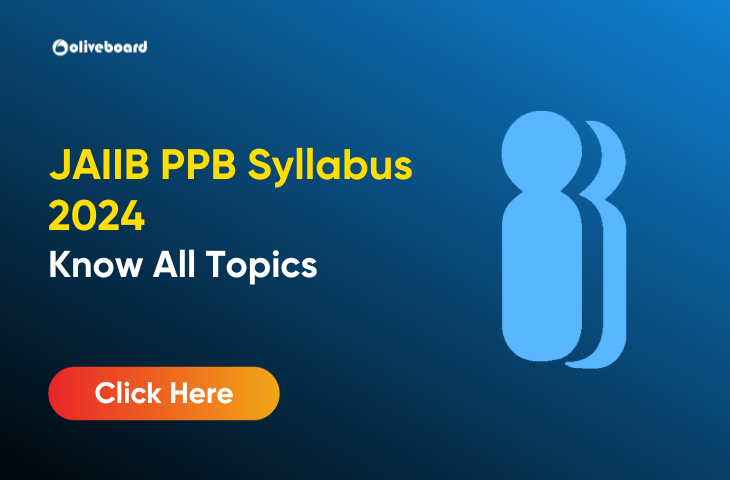JAIIB PPB Syllabus: The JAIIB Principles and Practices of Banking (PPB) exam is a test about basic banking. It covers things like how banks work, the rules they have to follow, and how they manage risks. People studying for it learn about different banking tasks, like giving out loans and helping customers. The exam also looks at banking ethics and laws. Passing the JAIIB PPB exam shows that someone knows the important stuff about banking. It helps them do better in their job at a bank and shows they’re good at what they do.
JAIIB PPB Syllabus 2024
JAIIB PPB Syllabus: The Indian Institute of Banking and Finance or IIBF conducts the JAIIB exam twice a year. The Junior Associate for the Indian Institute of Banking or JAIIB exam is the first promotional exam for banking professionals. Principles and Practices of Banking is the second paper of four for the exam. This article will provide a detailed JAIIB PPB syllabus.
JAIIB PPB Syllabus – Exam Pattern
Before we get into the syllabus, let’s take a look at the question and mark distribution for PPB.
| Subjects | No. of Questions | Total Marks | Duration |
| Principles and Practices of Banking | 100 | 100 | 2 hours |
As you can see, the paper consists of 100 questions for a total of 100 marks. The paper is of a 2-hour duration. There is no negative marking and candidates require a minimum of 50 marks out of 100 to clear the paper.
JAIIB Principles and Practices of Banking Syllabus
Paper 2 of JAIIB is Principles and Practices of Banking. The paper consists of a total of 4 modules as listed below:
- General Banking Operations
- Functions of Banks
- Banking Technology
- Ethics in Banks and Financial Institutions
PPB Module A Syllabus – General Banking Operations
The syllabus for Module A of PPB is below:
| Unit | Topics |
| Banker-Customer Relationship | Requirements to be Called a Bank, Banker-Customer Relationship, Bank as a Trustee, Bailee Bailor Relationship, Agent-Principal Relationship, Lessor and Lessee, Indemnifier and Indemnified, Different Deposit Products or Services, Services to Customers and Investors. |
| AML-KYC Guidelines | Money Laundering & Financing of Terrorism Risks, AML Framework in India, Know Your Customer Policy, Organisational Set-up for AML, Obligations under PMLA, Risk Management, Obligations under International Agreements, FATF Identified Jurisdictions, Correspondent Banks, Reporting Under FATCA/ CRS, Reporting Obligations, Implications of Non-compliance of PMLA Obligations, Secrecy Obligations. |
| Operational Aspects of KYC | Know Your Customers (KYC) Norms, Wire Transfers, Other Operations – Regulations, Central, KYC Records Registry (CKYCR), Monitoring of Transactions. |
| Opening Accounts of Various Types of Customers | Personal Accounts, Accounts of Other Customers, Norms for Opening Current Accounts, Obtaining Photographs of Account Holders, Legal Entity Identifier. |
| Operational Aspects of Deposit Accounts | Salient Feature of Deposit Accounts, Interest on Deposit Accounts, Prohibitions & Exemptions, Inoperative Accounts & Unclaimed Deposits, Operational Instructions in Joint Accounts, Nomination Facility, Other Operational Guidelines, Attachment Orders, Procedure for Submission of Records to Statutory Authorities. |
| Operational Aspects of Handling Clearing/Collection/Cash | Cheque Truncation System (CTS), RBI Guidelines on Collection of Instruments, Cash and its Custody, Security Arrangements at Branches and ATMs |
| Banker’s Special Relationship | Mandate – Definition, Power of Attorney (POA) – Definition, Banker’s Lien, Right of Set-off, and Right of Appropriation. |
| Foreign Exchange Remittance Facilities for Individuals | Evolution of FEMA, Definitions, Bringing in and Taking out Foreign Exchange, Inward Remittances, Outward Remittances, and Indo – Nepal Remittance Scheme. |
| Operational Aspects of NRI Business | Permitted Accounts in India for NRIs and PIOs, Accounts in India of Foreign Nationals Visiting India, Special Non-Resident Rupee Account – SNRR Account, Remittance of Assets Held by NRIs/ PIOs, Acquisition and Transfer of Immovable Property in India by a Non-Resident Indian (NRI), Creation of Charge on Immovable Property in India, Repatriation of Income and Sale, Proceeds of Assets Held Abroad by NRIs, and Investments by NRIs/ PIOs. |
| Foreign Currency Accounts for Residents and Other Aspects | Types of Accounts Permitted, Foreign Currency Denominated Accounts in India, Permitted Foreign Currency Accounts Outside India Remittance of Assets by Foreign Nationals not Being PIOs, Modes of Acquiring Property Outside India by a ResidentForeign Contribution (Regulation) Act 2010 |
| Cash Management Services and Its Importance | Developments in CMS, Importance of Cash Management Systems, Types of Cash Management Services, Challenges and Issues |
| Payment and Collection of Cheques and Other Negotiable Instruments | Negotiable Instruments Act, Payment of a Cheque, Payment in due course – Section 10, Liability of the Paying Bank – Section 31, Collection of Cheques – Duties of a Collecting Bank, Endorsement of Cheques, Crossing of Cheques, Forged Instruments, Bouncing (Dishonour) of Cheques. |
| Responsibility of Paying Bank | Negotiable Instruments Act and Paying Banks, Liability of Paying Banker when Customer’s Signature on the Cheque is Forged, Payment to be in Due Course for Bank to Seek Protection, Payment in Good Faith without Negligence of an Instrument on which Alteration is not Apparent, Payment by Bank Under Mistake Whether Recoverable Cheque Truncation. |
| Responsibility of Collecting Bank | Statutory Protection to Collecting Bank and Duties of the Collecting Bank |
| Ancillary Services | Remittances: Introduction, Demand Drafts (DD) and Banker’s Cheques (BC), Mail Transfer (MT), Telegraphic Transfer (TT), National Electronic Funds Transfer System (NEFT), Real Time Gross Settlement System (RTGS), Electronic Benefit Transfer (EBT) Scheme, Mobile Banking in India, Electronic/Digital Payments, Safe Deposit Lockers, Portfolio Management Services, Merchant Banking, Government Business, Levying of Service Charges. |
| Financial Inclusion & Financial Literacy | Financial Inclusion by Extension of Banking Services, Use of Mobiles/Tablets in Financial Inclusion Drive, Financial Literacy, Rural Self Employment Training Institutes (RSETI). |
| Customer Service Guidelines | Customer Service in Banks, Policy for General Management of the Branches, ATM Operations, Security Issues and Risk Mitigation Measures, Service at the Counters, Information to the Customers, Special Arrangements at Branches, and Other Provisions. |
| Duties & Rights of a Banker and Customer Rights | Duty of Secrecy & Confidentiality, Duty of Reasonable Care, Garnishee or Attachment Order, Bank’s Rights, Customer Awareness, Banking Codes and Standards Board of India, Obligations on the Customer. |
| Grievance Redressal & RBI Integrated Ombudsman Scheme 2021 | Model Policy on Grievance Redressal, Internal Machinery to Handle Customer Complaints/Grievances. The RBI – Integrated Ombudsman Scheme. |
| The Consumer Protection Act, 2019: Preamble, Extent and Definitions | Purpose of The Act, Preamble and Extent, Act not Overriding on Any Other Law, Salient New Aspects of CPA 2019, Definitions, Various Fora Consumer Protection Councils, Central Consumer Protection Authority, Consumer Disputes Redressal Commissions, Jurisdictions of Commissions, Complaints to District Commissions, Complaints to State Commissions/ National Commission, Appeals Against Orders of District/ State Commission, Other Aspects, Mediation Process, Product Liability, Unfair Contracts, and Data Protection. |
| The Right to Information Act, 2005 | Applicability, Definitions, Right to Information, Obligations of Public Authorities, Designation of Public Information Officers, Procedure for Obtaining Information, Disposal of Request, Appeal, Orders in Appeal, Central Information Commission, State Information Commission, Penalties, and Act to Have Overriding Effect. |
PPB Module B Syllabus – Functions of Banks
The syllabus for Module B of PPB is below:
| Unit | Topic |
| Banker Customer Relationship | Types; Different Deposit Products & Services, Services to Customers & Investors |
| KYC/ AML/ CFT norms | PMLA Act and KYC Norms |
| Bankers’ Special Relationship | Mandate; POA, Garnishee Orders, Banker’s Lien |
| Consumer Protection – COPRA, Banking Ombudsman Scheme | Operational Aspects of COPRA Act & Banking Ombudsman Scheme |
| Payment and Collection of Cheques and Other Negotiable Instruments | NI Act; Role & Duties of Paying & Collecting Banks, Endorsements; Forged Instruments, Bouncing of Cheques, Its Implications, Return of Cheques, and Cheque Truncation System |
| Opening accounts of various types of customers | Operational Aspects of opening and Maintaining Accounts of Different Types of Customers including AadhaarSB Rate Deregulation |
| Ancillary Services | Remittances, Safe Deposit Lockers, Govt. Business, and EBT |
| Cash Operations | Cash Management Services and its Importance |
| Principles of Lending, Working Capital Assessment and Credit Monitoring | Cardinal Principles, Non-fund Based Limits, WC, Term Loans, Credit Appraisal Techniques, Sources of WC Funds & its Estimation Operating Cycle, Projected Net WC Turnover Method, Cash Budget, Credit Monitoring & Its Management Base Rate. |
| P.riority Sector Advances | Targets; Sub-TargetsRecent Developments |
| Agricultural Finance | Types of Agricultural Loans, Risk Mitigation in agriculture (NAIS, MSP, etc.) |
| Micro, Small, and Medium Enterprises | MSMED Act, 2006 Policy Package for MSMEs Performance and Credit Rating Scheme Latest Developments |
| Government Sponsored Schemes | SGSY, SJSRY, PMRY, SLRS |
| Self Help Groups | Need for & Functions of SHGs, Role of NGOs in Indirect Finance to SHGs, SHGs & SGSY Scheme; Capacity Building |
| Cards, Home Loans, Personal Loans, Consumer Loans | Operational Aspects, Advantages, Disadvantages & Guidelines of Credit Cards, Procedure and Practices for Home Loans, Personal Loans and Consumer Loans |
| Documentation | Types of Documents; Procedure, Stamping, and Securitization |
| Different Modes of Charging Securities | Assignment; Lien; Set-off; Hypothecation Pledge; and Mortgage |
| Types of collaterals and their characteristics | Land & Buildings; Goods Documents of Title to Goods, Advances against Insurance Policies, Shares, Book Debts, Term Deposits, Gold, etc.Supply Bills |
| Non-Performing Assets | Definition; Income Recognition. Asset Classification, Provisioning Norms; CDR, Financial Inclusion BC; BF, Role of ICT in Financial Inclusion, Mobile-based transactions, RSETI |
| Financial Literacy | Importance of financial literacy and Customer awareness |
PPB Module C Syllabus – Banking Technology
The syllabus for Module C of PPB is below:
| Unit | Topics |
| Essentials of Bank Computerization | Computer Systems; LANs; WANsUPS; Core Banking |
| Payment Systems and Electronic Banking | ATMs; HWAK; PIN Electromagnetic Cards, Electronic Banking, Signature Storage & Retrieval System, CTS; Note & Coin Counting Machines, Microfiche; NPC; RUPAY |
| Data Communication Network and EFT systems | Components & Modes of Transmission, Major Networks in India, Emerging Trends in Communication Networks for Banking, Evolution of EFT System; SWIFT, Automated Clearing Systems, Funds Transfer Systems; and Recent Developments in India |
| Role of Technology Upgradation and its impact on Banks | Trends in Technology Developments, Role & Uses of Technology Upgradation; Global Trends, Impact of IT on Banks |
| Security Considerations | Risk Concern AreasTypes of Threats, Control Mechanism, Computer Audit, IS Security; IS Audit, Evaluation Requirements |
| Overview of IT Act | Gopalakrishna Committee Recommendations |
| Preventive Vigilance in Electronic Banking | Phishing; Customer Education, Safety Checks; Precautions |
PPB Module D Syllabus – Ethics in Banks and Financial Institutions
The syllabus for Module D of PPB is below:
| Unit | Topics |
| Ethics, Business Ethics & Banking: An Integrated Perspective | Business Ethics, Ethical Foundation, Banking Ethics in Global and Indian Contexts. |
| Ethics at the Individual Level | Values, Norms, Beliefs, Morality, Conflict, Integrity, Golden Rule, and Dilemmas Decision-Making |
| Ethical Dimensions: Employees | Obligation to Bank/ Third Parties, Abuse of Official Position, Sexual Harassment, Conflict of Interest, Fair Accounting Practices, HRM Ethics, Employees as Ethics Ambassadors & Managers as Ethical Leaders. |
| Work Ethics and the Workplace | Work Ethics, Benefits of Ethical Behavior, Unethical Behavior: Causes and Remedies, Code of Ethics Manual, Whistleblowing in Banks, Whistleblowing Laws in India |
| Banking Ethics: Changing Dynamics | Ethics and Technology, Data Security and Privacy, Intellectual Property Rights, Patents, and Proprietary Rights, Ethics of Information Security, Cyber Threats, and Digital Rights Management |
| Related Links | Related Links |
| JAIIB Notification | JAIIB Syllabus |
| JAIIB Exam Date | JAIIB Admit Card |
| JAIIB Previous Year Papers | JAIIB Study Material |
| JAIIB Cut Off | JAIIB Eligibility |
| JAIIB Certificate | JAIIB Mock Test |
- JAIIB Previous Year Question Papers, Download PDF
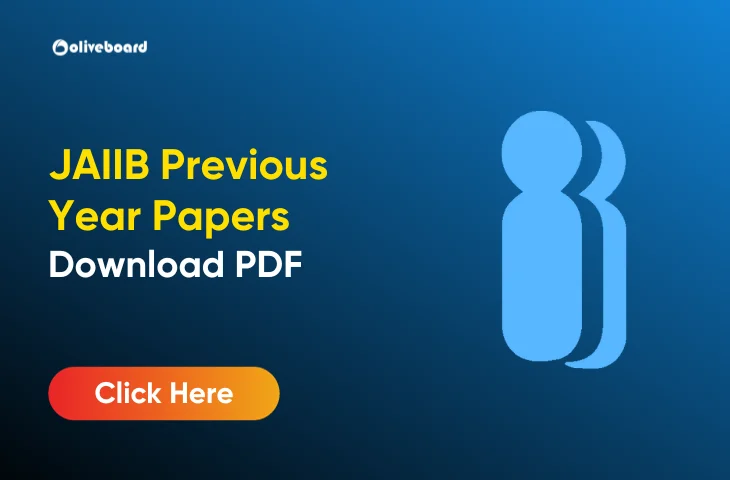
- JAIIB Study Material 2024, Download Subject Wise Notes
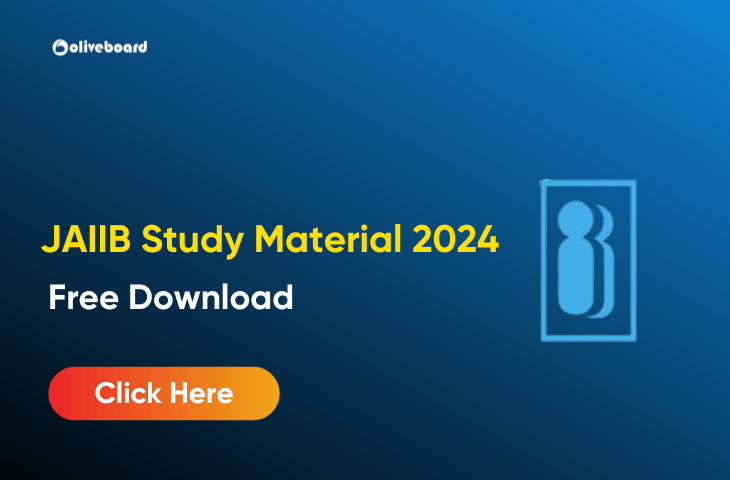
- JAIIB Preparation Strategy 2024, Crack JAIIB In Your First Attempt
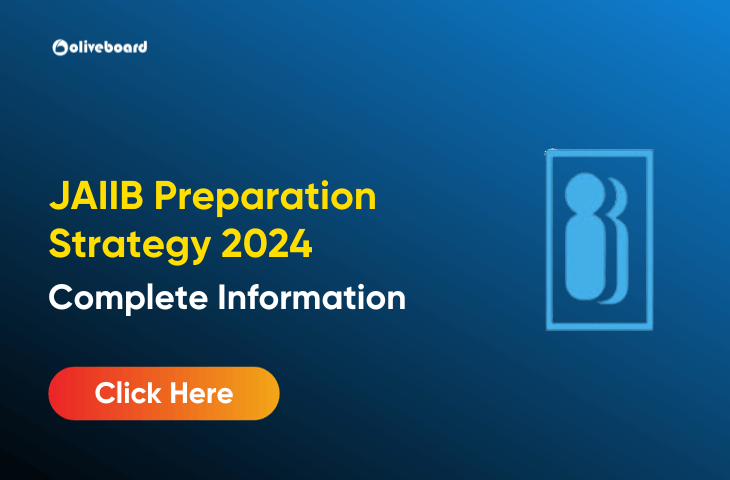
- JAIIB Important Topics for IE & IFS, PPB, AFM, and RBWM 2024
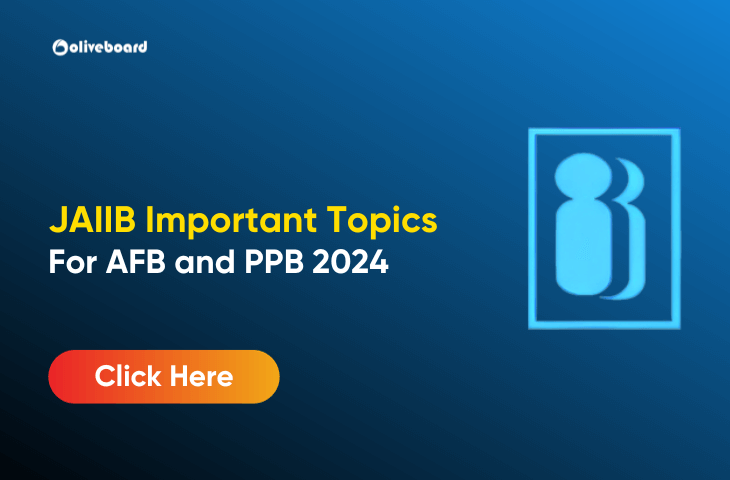
- JAIIB Salary 2024, Check Pay Scale, Salary Structure & Job Profile
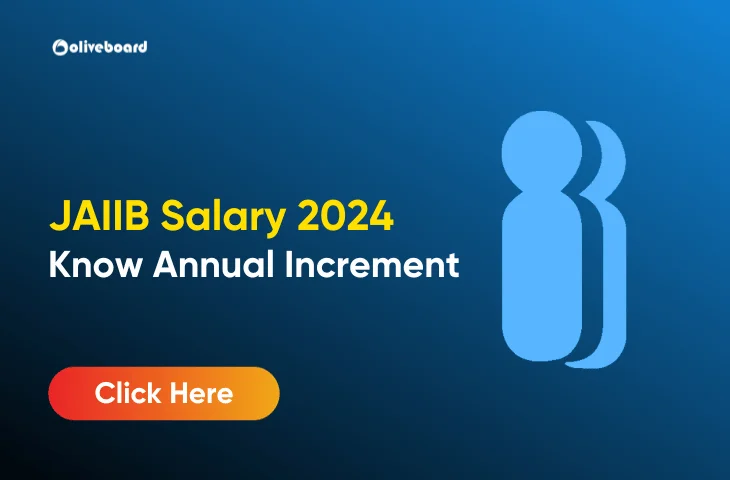
- JAIIB Cut Off 2024, Check JAIIB Minimum Cut Off
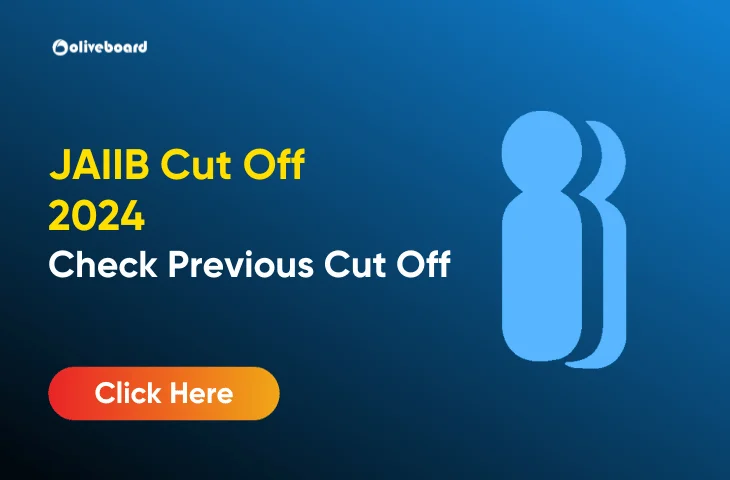
JAIIB PPB Syllabus – Frequently Asked Questions
A1. JAIIB PPB ie. JAIIB Paper 2 consists of 100 questions for 100 marks.
A2. The Principles and Practices of Banking for JAIIB has a total of 4 modules.

I write content to help people prepare for banking exams because I have experience as an aspirant myself. My goal is to provide accurate and easy-to-understand information for candidates. I cover various topics such as exam patterns, syllabus, study techniques, and time management to support those preparing for the exams. As a former aspirant turned content writer, I want to make the information accessible and helpful for others so that they can do well in their banking and government exams and achieve their goals.
Oliveboard Live Courses & Mock Test Series
- Monthly Current Affairs 2024
- Download RBI Grade B PYQ PDF
- Download IFSCA Grade A PYQs
- Download SEBI Grade A PYQs
- Attempt Free SSC CGL Mock Test 2024
- Attempt Free IBPS Mock Test 2024
- Attempt Free SSC CHSL Mock Test 2024
- Download Oliveboard App
- Follow Us on Google News for Latest Update
- Join Telegram Group for Latest Govt Jobs Update
